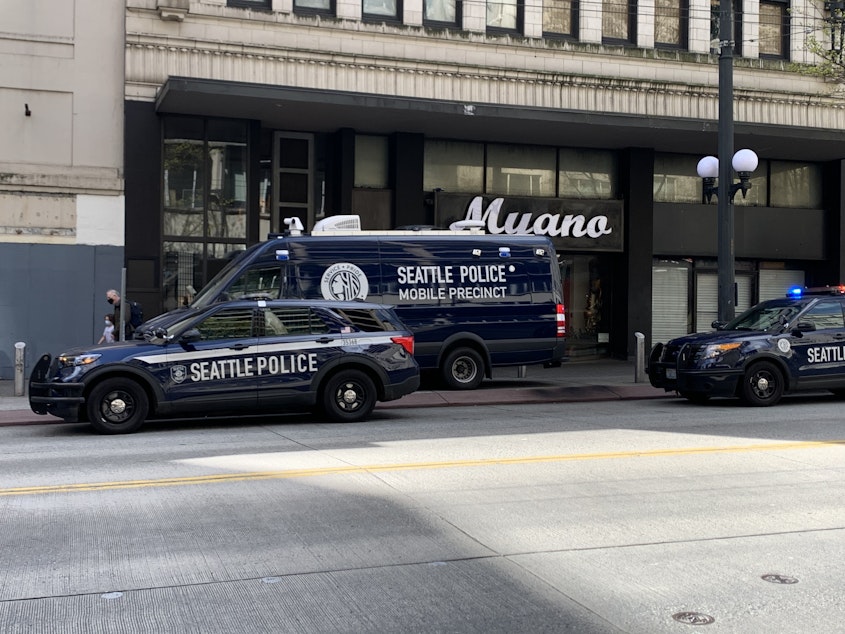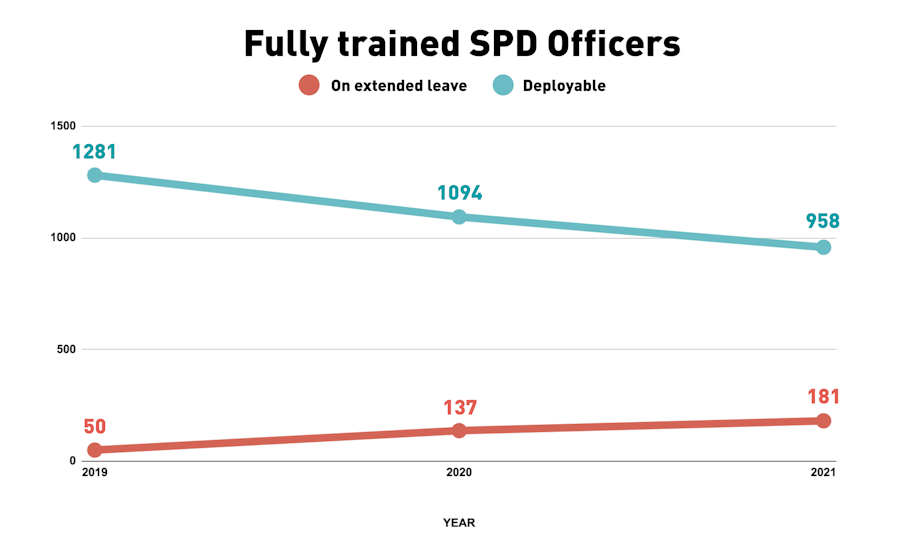Seattle rape cases moved to back burner, police insiders say

Investigating sex crimes has become much less of a priority in Seattle.
In the last year, Seattle Police have forwarded far fewer sex assault cases to the King County Prosecutor’s Office. Meanwhile, arrests for sex crimes involving adults and children have plummeted: This year so far, 1.6% of cases investigated by the sexual assault and child abuse unit have resulted in an arrest, down from 14% in 2019.
This impacts adult victims most often; two employees of Seattle Police confirmed that adult sex assault cases are seldom assigned — a recent development.
In March, outside of arrests, not a single sexual assault case involving an adult victim was assigned to a detective, according to documentation provided by a Seattle Police employee.
The Seattle Police Department says there are fewer officers to investigate these crimes. The two anonymous Seattle Police employees agreed that employee retention is part of the problem; 16% of Seattle officers are on leave. Others have left permanently. But it’s not the only reason, they say.
Sponsored
A new mayor means a new policing strategy, and Mayor Bruce Harrell made it clear during his campaign that he aims to address “visible crime.”
Since Harrell assumed office, at least seven patrol officers have been moved over to help empty tent encampments. Seattle officers are targeting city crime “hot spots,” people purchasing and selling drugs, and stolen goods from big-box stores.
The staffing challenges within the specialty teams of the Seattle Police Department are driven by the lack of active police staffing, Jamie Housen, spokesperson for Mayor Harrell, said by email. He said Harrell has often called for Seattle Police staffing to be restored.
The two Seattle Police employees who communicated with KUOW asked not to be named because it is a policy violation to discuss their work with journalists.
Police departments across the country are struggling to recruit and retain officers. Seattle Police employee numbers have been on a downward trend for two years, leaving the department understaffed and clamoring for more bodies, as department heads attempt to address both the needs of the city and the demands of its leaders.
Sponsored
The challenges are plenty. Seattle’s year-end crime report states violent and property crime is up. Harrell promised to address crime hotspots and repeat offenders of low-level crimes. He’s been vocal about removing unhoused people from Seattle streets, and officers are being tapped for his cause.
Meanwhile, adult victims of sexual assault have been sidelined, according to officers. It’s the visible crime that’s being prioritized, not the invisible, they said.
“The Seattle Police Department sexual assault unit is not at all investigating adult sexual assault reports or cases unless there was an arrest,” said one source inside the Seattle Police Department.
Four detectives handle sexual assault and child abuse cases in Seattle currently. Crimes against children are the highest priority, because Washington state law requires investigation into these crimes, whereas adult sex assault reports have a longer window in which officers may begin investigating them.
“Our child cases are increasing due to the fact that children are coming back to school from Covid,” the Seattle Police employee said. “There's more reporting, and we are seeing an aggressive level of child abuse than we have seen previously.”
Sponsored
Mayor spokesperson Housen said the sexual assault and child abuse unit decreased to four detectives before Harrell took office.
Seattle detectives continue to investigate crimes reported in early 2020, the employee said. These cases require search warrants, witness interviews, and DNA evidence — which take time.
Fewer officers means that in some cases, people calling to report a sexual assault are routed to the automated telephone reporting unit, designed to address non-urgent calls such as stolen checks.
It has always been difficult for survivors who choose to report their assault to police, or pusue criminal charges, said Mary Ellen Stone, chief executive officer of King County Sexual Assault Resource Center. Stone pointed to a report her group published last year, which found that among a backlog of cases in King County Superior Court, there was 408 sexual assault victims who had been waiting on average 563 days for disposition.
A 2020 report by the King County Auditor’s Office found the King County Sheriff's Office and the Prosecuting Attorney’s Office sometimes didn’t interview sexual assault victims within the recommended time frame, and deputies failed to provide advocacy information, a requirement by law.
Sponsored
“We want to look at this not as ‘Oh, my goodness this all of a sudden happened,’” Stone said. “But this has been the state for some time, and now it’s worse.”
Sponsored
Jordan Walker, a legal advocate with the King County Sexual Assault Resource Center, said he understands that law enforcement agencies are struggling to find staff, but that there are long-term impacts of short staffing. People who file reports but are then ignored would be justifiably frustrated, and share their negative experiences with others in their community – leading to fewer people filing reports in the future.
“When the front door into a criminal case, into someone hearing your story, someone looking into your story, when that door is locked, and you can't even get in, the whole system can feel disenfranchised,” Walker said.
He said if cases reported to police aren't being investigated, then the problem isn't improving.
The number of Seattle police officers has gone down since 2019, said Greg Doss, fiscal and policy analyst with the City of Seattle.

There were 958 deployable officers at the end of December; in 2019, there were 1,281.
Sponsored
Doss said a big part of the staffing problem is attributed to officers out on extended leave. This issue began in 2020, he said by email. Many of the officers on extended leave now are using their accrued time, likely before departing permanently.
Some of those were employees who refused to get vaccinated by Oct. 18, Doss said.
The Seattle Police Department declined to provide KUOW with details on caseloads and which units officers are assigned to, due to their “fluid nature,” and as a “matter of policy,” Seattle Police spokesperson Randall Huserik said by email.
In his 2021 year-end crime report, Interim Chief Adrian Diaz said that there had been a reduction in rape cases. But documents obtained by KUOW show that the number of cases coming into the sexual assault and child abuse unit have increased since 2019. These numbers do not separate out rapes from other sexual assaults.
Data from the King County Prosecutor’s Office shows that fewer Seattle Police cases, including those from the sexual assault and child abuse unit, are being sent to prosecutors to determine if charges should be filed.
Chief Diaz has prioritized deploying officers to high-priority emergency calls, and deterring “crime through proactivity,” his spokesperson Randy Huserik said. The Seattle Police blog is peppered with the details of recent shootings, robberies, and photos of guns and drugs police have seized.
Thirty officers make up the Community Response Group, a project Chief Diaz launched in 2020 to lead protest response and work citywide to “enhance 911 and emergency response,” the Seattle Police blotter says.
This roaming unit of cops on March 31 helped to make 49 shoplifting arrests. They detained a young woman with a baby, after a man who was accused of stealing throw pillows and a memory foam mattress, got in her car at a Lowe’s Home Improvement in Rainier Valley. The woman was driving and fled when police flashed their lights. Several police cars followed them to north Seattle.
Seattle Mayor Harrell continues to make good on his campaign promise to clear the homeless from Seattle’s public spaces, with officers present and available to intervene when activists and mutual aid workers are accused of interfering with the clearing of the homeless.
Seven patrol officers recently moved into the team that assists in emptying out homeless encampments around Seattle — the Alternative Response Team — to aid with this effort and work hot-spot emphasis areas downtown and in the International District.
These actions hearken back to statements made by Harrell in 2012, as a council member concerned about the intersection of Third Avenue and Pine Street, the heart of downtown Seattle.
"You will see open-air drug dealing. You'll see panhandling that's way too aggressive," then City Councilmember Bruce Harrell told KOMO News. "It's just not a pleasant place to be — and it should be."
“A general funding and staffing crisis for SPD is being exacerbated by politics,” a Seattle Police employee wrote anonymously on social media. KUOW confirmed the author’s identity.
The Seattle Police employee questioned Diaz’s decision to relocate seven officers from patrol to the Alternative Response Team.
“Those officers, while certainly needed, will be spending much of their time working with homeless people who haven't asked for help from the City and in many cases won't accept it,” the officer wrote.
“Meanwhile vulnerable crime victims who desperately want and need help from SPD are being put on hold. And people in the sexual assault unit are left wondering: If there were seven officers to spare, why couldn't one or two have been assigned to them?”
Harrell seemed to approve of Diaz’s approach. He announced a national search for a new police chief last week, and in his announcement expressed his satisfaction with Interim Chief Diaz, and how he’s running the police department.
“I have been pleased with Interim Chief Diaz’s approach and commitment to progress on public safety,” Harrell said in a press release. He encouraged Chief Diaz to apply for the job.
Editor’s note: After KUOW published this article, the Mayor's Office provided additional comment which was included in the story and the following statement:
“Any lack of urgency around sexual assault investigations or arrests is wholly unacceptable. Sexual assault cases must be exhaustively investigated, and offenders must be held accountable – period. When we assumed office, the SPD Sexual Assault Unit had a depleted number of deployable staff and our evaluation of these limited resources underscore the need for increasing SPD staffing to ensure justice for survivors. Chief Diaz is already in the process of providing our office with detailed and data-based information on the status of sexual assault investigations and what immediate improvements can be made in this area, including additional staff. Our administration's proposed budget will reflect this priority by increasing detectives, resources, and specific training for investigations.”
Ashley Hiruko is an investigative reporter at KUOW. She can be reached at hiruko@kuow.org or 206-574-8007
Amy Radil contributed reporting for this piece.
Resources for victims and survivors of abuse:
- King County Sexual Assault Resource Center: 888-998-6423 // Hotline for therapy, legal advocates and family services
- UW Medicine Center for Sexual Assault & Traumatic Stress: 206-744-1600 // Hotline, resources including counseling and medical care
- Washington Coalition of Sexual Assault Programs // List of providers across the state that offer free services.
- Rape, Abuse, Incest National Network (RAINN): 800-656-4673 // Hotline and/or online chat with trained staff

